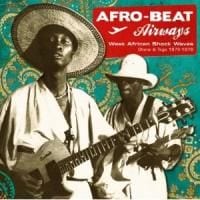
It’s been a great few years for vintage African rock, soul and funk. Labels like Academy Records and Analog Africa have been busy scouring the continent for forgotten albums by obscure (to the West) bands, and stellar compilations like Legends of Benin and Lagos Disco Inferno have been the happy result. Groundbreaking musicians, such as Orchestre Poly-Rhythmo de Coutono, are finally getting the recognition accorded better-known superstars like Fela Kuti.
Now Analog Africa, whose 2008 collection African Scream Contest rescued a set of “raw and psychedelic” tunes from the brink of obscurity, brings another collection. Afro-Beat Airways, which is sub-titled West African Shock Waves, presents a set of songs dating from 1972-78 Ghana and Togo. It is an infectious collection of grooves, albeit a trifle samey-sounding after 40 minutes or so.
Opener “Dankasa” from Uppers International introduces many of the ingredients that will recur throughout the record: chipper vocals, organ and guitar flourishes, and layers of percussive rhythms that add up to a loose, funky flow. Follow-up track “Ma Nserew Me” by The Apagya Show Band adds an insistently screeching farfisa to the mix. Marijata’s “Break Through” could be a lost soul/funk concoction courtesy of Motown or Stax, right down to the bright, brassy horns and gallopping bassline.
“Awula Bo Fee Ene” by Orchestre Abbass is not exactly a slow number, but its tempo is somewhat less frenetic than the other early songs in the set, which allows the listener a chance to pause and catch his/her breath. Not for long, though: at nearly 10 minutes, “Odofo Nyi Akyiri Biara” by Ebo Taylor and the Sweet Beans features the same insistent rhythms, staccato horns and propulsive drumming also featured in many of the early tunes.
So it goes: the back half of the record plays much like the first half. This seems like something of a missed opportunity — surely not every song recorded during these years was a bright, loud dance number, right? But slower songs are few and far between, and the tempo is relentlessly upbeat, which gets exhausting after a while. On the other hand, when an album offers 75 minutes of music, it seems churlish to complain.
Besides, there are gems to be found here. “More” by Rob features a nifty processed synthesizer line snaking across staccato guitar rhythms and a motoring bassline. “Ne Noya” by Cos-Ber-Zam finds a midtempo groove fueled by chanted vocals and a simple guitar/drums/organ arrangement that feels as though it could sail along for hours, rather than its woefully short four minutes. Album closer “Come Along” by Ebo Taylor and the Pelicans taps into the prevailing horns ‘n bass vibe, with the addition of wah-wah guitar.
The vinyl format of the album offers two songs not included on the CD — remember when it was the other way around? — and includes a 44-page booklet filled with, one presumes, photos and notes on the artists. (The booklet was not included with the advance review copy.) The care that went into this package is undeniable, but above all, this is music that sounds like nothing else you’re likely to hear this year. Here’s hoping that Analog Africa unearths enough gems in their travels to ensure many future releases.

![Call for Papers: All Things Reconsidered [MUSIC] May-August 2024](https://www.popmatters.com/wp-content/uploads/2024/04/all-things-reconsidered-call-music-may-2024-720x380.jpg)



